- Home
- Bette Lee Crosby
Cracks in the Sidewalk
Cracks in the Sidewalk Read online
Cracks in the Sidewalk
A Novel
Bette Lee Crosby
Cracks in the Sidewalk
Fourth Edition
Copyright 2009 by Bette Lee Crosby
All rights reserved.
Cover Design:
Michael G. Visconte
Creative Director
FCEdge
ISBN# 978-0-9891289-3-3
Bent Pine Publishing
Stuart, Florida
License Notes:
This ebook is licensed for your personal enjoyment only. This ebook may not be re-sold or given away to other people. If you would like to share this book with another person, please purchase an additional copy for each person you share it with. If you’re reading this book and did not purchase it, or it was not purchased for your use only, then please return it and purchase your own copy. Thank you for respecting the hard work of this author.
Publisher’s Note:
No part of this book may be reproduced, scanned, or distributed in any printed or electronic form without express written permission from the publisher. The scanning, uploading, and distribution of this book via the Internet or any other means without the permission of the publisher is illegal and punishable by law. Please do not participate in or encourage piracy of copyrighted materials in violation of the author’s rights. Purchase only authorized editions.
Without limiting the rights under copyright reserved above, no part of this publication may be reproduced, resold (as a “used” e-book), stored or introduced into a retrieval system, or transmitted, in any form or by any means (electronic, mechanical, photocopying, recording or otherwise), without prior written permission of both the copyright owner and the above publisher of this book.
Although this book is based on a true story and many of the events in this story actually happened, it is still a work of fiction. While, as in all fiction, the literary perceptions and insights are based on life experiences and conclusions drawn from research, all names, characters, places and specific instances are products of the author’s imagination and used fictitiously. No actual reference to any real person, living or dead, is intended or inferred.
Begin Reading
Table of Contents
Also By Bette Lee Crosby
Table of Contents
Acknowledgements
Chapter One
Chapter Two
Chapter Three
Chapter Four
Chapter Five
Chapter Six
Chapter Seven
Chapter Eight
Chapter Nine
Chapter Ten
Chapter Eleven
Chapter Twelve
Chapter Thirteen
Chapter Fourteen
Chapter Fifteen
Chapter Sixteen
Chapter Seventeen
Chapter Eighteen
Chapter Nineteen
Chapter Twenty
Chapter Twenty-One
Chapter Twenty-Two
Chapter Twenty-Three
Chapter Twenty-Four
Chapter Twenty-Five
Chapter Twenty-Six
Chapter Twenty-Seven
Chapter Twenty-Eight
Chapter Twenty-Nine
Chapter Thirty
Chapter Thirty-One
Chapter Thirty-Two
Chapter Thirty-Three
Chapter Thirty-Four
Chapter Thirty-Five
Chapter Thirty-Six
Chapter Thirty-Seven
Chapter Thirty-Eight
Chapter Thirty-Nine
Chapter Forty
Chapter Forty-One
Chapter Forty-Two
Chapter Forty-Three
Chapter Forty-Four
Chapter Forty-Five
Chapter Forty-Six
Also By Bette Lee Crosby
Acknowledgements
A novel does not come together without the help of many people—readers, editors, designers and the technical geniuses who translate an author’s words into readable electronic formats. I am fortunate to be working with some of those that I consider the best in the business, and I am eternally grateful to the following people:
Michael G. Visconte…Creative Director of FC Edge in Stuart, Florida… a design genius who finds the heart and soul of every story and transforms it into a breathtakingly beautiful cover. Thank you Michael.
Ekta Garg…Editor extraordinaire and a woman who catches all my mistakes without ever losing sight of my voice. No easy task, but she does it with grace and charm. I count Ekta among my many blessings.
Danielle Benson…The absolutely best formatter in the universe. Thank you for having the ability to find even the oddities that seem to sneak in and out like thieves in the night.
Naomi Blackburn… Thank you for being an early reader and helping me to see beyond myself. Your suggestions are both wise and wonderful.
Geri Conway…I am blessed to have you as my sister and thankful for all the other roles you play—those of a listener, sounding board, advisor, early reader, and constant supporter.
Lastly, I am thankful beyond words for my husband, who puts up with my crazy hours, irrational thinking, and late or non-existent dinners. I could not be who I am without you, Dick, and I pray that neither of us ever lose sight of this awesome blessing God has given us.
Cracks in the Sidewalk
“To send a letter is a good way
to go somewhere
without moving anything
but your heart”
Phyllis Theroux
Claire McDermott
I’m an old woman now, but this dream I have has been with me all my life. Some people claim it’s just wishful thinking. Whether or not that’s true I can’t say, but I do know these images have warmed the inside of my heart for more years than I can remember. When I close my eyes and drift into the dream, it’s always the same. I see myself as part of the family that never was—imaginary sisters, brothers, aunts, uncles, cousins. We’re crowded elbow to elbow around a dining room table, everybody talking at once and no one minding.
I created this family the year I turned nine. It was the same year I came to know the loneliness of being an only child. Luckily dreams have no limitations, so I was free to build my own world. For a lonely little girl that world meant a big family.
Sadly, that wasn’t my life. I was an only child. My family was just Mama and Daddy, two loners who got married and had a single baby. I begged Mama for a baby sister or brother, but she’d squish her nose up like she smelled something bad and answer, “Claire, I don’t know where you get these crazy notions. Certainly not from your father or me, we’re practical people.”
They were practical. Parents who believed children should be seen and not heard. As they discussed the news of the day, I sat at the dinner table, silent. That’s when I began creating my imaginary family. In no time at all I could close my eyes and see every one of their faces. I knew all their secrets and what each of them would do in any given situation. First came my sister, Nora. After Nora came an overly protective brother, Paul. A lengthy succession of cousins, aunts, and uncles followed.
In time, Charlie happened along. He wasn’t a member of my imaginary family. He was a flesh-and-blood person who loved me as I did him and agreed a dozen babies was just about the right number.
We were married in 1955, and one year later I gave birth to Elizabeth. She was barely three weeks old when I began to hemorrhage and woke up in the hospital with Doctor Kerrigan explaining how this was to be the only child I would ever have.
I know every mother claims her child is beautiful, but Elizabeth truly was. Lying there in her crib she looked like one of those paintings
of golden-haired cherubs. Pink and dewy as a rosebud with the tiniest, most perfect fingers I’d ever seen. Many nights I slipped out of my bed to stand alongside her crib and watch the delicate whispers of breath rise and fall in her chest.
“It’s not fair,” I told Charlie, “that she should be an only child.” I suggested adoption, but somehow Charlie could never wrap his arms around that suggestion.
“You never know,” he’d answer. “Maybe Doctor Kerrigan is wrong. Let’s not rush into something. Give it time. Wait and see.”
So we waited, and God knows we tried, but we never did have another baby. In the end, Elizabeth had to travel the same road I’d gone down. Understanding how lonely that can be, I vowed to make it better for her.
No matter how much love a mama tries to give her child, they still need playmates. And my little girl had plenty. When she was so tiny she had to stand on a stool to reach the counter, we made cookies and invited over a bunch of neighborhood kids. After that it was Brownie Troop, then Girl Scout meetings, football parties, sleepovers, and almost anything else I could think of. Looking back I can honestly say Elizabeth’s face never showed the loneliness I’d seen on my own.
She had more friends than a person could count. Elizabeth was full of laughter and kindness with eyes the color of a summer sky and a smile that made other people smile back. She was one of the most popular girls in Westfield High and could have dated any boy in town. But, wouldn’t you know, she picked Jeffrey Caruthers—a lanky string bean with the personality of a footstool. He latched on to her like she was money in the bank and went everywhere she did.
Early in the morning, before we were fully awake, the telephone started ringing. It was usually Jeffrey calling to ask if he could walk her to school or take her to a movie. They’d spend an entire day together, then an hour after he brought her home the telephone would start ringing again. Some evenings we’d be fast asleep, and he’d wake us because he just had to say good night.
Jeffrey went way beyond being a pest, and it’s regrettable that we didn’t do anything to squelch it. But Elizabeth was barely sixteen at the time, so we figured he was little more than a passing fancy.
“Don’t worry,” I told Charlie. “The likelihood is she’ll have dozens of boyfriends before she’s ready to settle down.”
Unfortunately, that didn’t happen.
They continued dating all summer, throughout the fall, and right into winter—Elizabeth not the least bit interested in any other boy and Jeffrey attached to her like a Siamese twin. Four or five nights a week he’d have dinner at our house, and on the occasional night when he did stay home he’d telephone every few hours.
“Doesn’t your family object to your not coming home for dinner?” I finally asked.
“Not at all,” he answered. Then he and Elizabeth exchanged one of those lovesick puppy dog looks they’d begun to share. After a few years, Charlie and I realized that Jeffrey would probably become our son-in-law.
On Elizabeth’s twentieth birthday they went out to dinner. She came home wearing the happiest smile I’ve ever seen and a two-karat diamond ring. That was that. They were engaged, and there was no looking back. Every time Elizabeth glanced at the ring she’d start talking about what a wonderful husband Jeffrey would be.
“Not just a wonderful husband,” she’d sigh with happiness, “but, like Daddy, he’ll be a wonderful father.”
At the time I agreed, thinking only a man crazy in love would put such a sizeable diamond on his fiancée’s finger. I didn’t realize that’s simply the way Jeffrey is—he’s got an almost obsessive need to impress people with what he has or owns. Unfortunately, that ring earmarked our beautiful daughter as something belonging to him.
For someone with such an appetite for material possessions, it’s hard to believe he could squander money the way he did. That’s partly to blame for what happened. Money—or, I should say, his lack of it.
When Elizabeth married Jeffrey T. Caruthers, who by then answered only to JT, I trusted they’d live happily ever after. She was head-over-heels in love with him, and he seemed just as crazy about her. I’ve never seen anyone act more devoted than that boy. He was always wrapping his arm around Elizabeth’s shoulder or twining his fingers through hers. And he’d tell anyone who’d listen how beautiful and smart she was. A man like that is simply not the sort you would have cause to doubt.
Charlie felt otherwise. He had misgivings about a lad who seldom looked a person square in the eye and labeled himself with initials.
“You can’t do a thing about it,” I told him. “Elizabeth loves that boy as much as he loves her.”
Of course he grumbled and groused a bit, but I figured it had to do with him losing a daughter rather than Jeffrey’s shortcomings. After Charlie learned to live with their relationship, he treated JT like a son.
Two nights before the wedding at their rehearsal dinner, Elizabeth beamed and announced, “JT and I are planning to have nine kids, right, JT?”
When he gave a nod of agreement, my heart almost exploded with happiness. Grandchildren!
“See, you were wrong about the boy,” I whispered to Charlie. Suddenly I was on the verge of having the big family I’d always wanted.
I assumed they would start right away, but week after week went by with no further mention of babies. Then eighteen months after the wedding, on an ordinary Tuesday evening when they’d come for a meatloaf dinner, I noticed something different about Liz. She bubbled like a glass of champagne. After dinner she gave us the news that they were expecting their first child.
“Isn’t it wonderful, Mom?” she said, rubbing little circles on her still-flat tummy.
I had dozens of questions. Was she feeling okay? Any morning sickness? When was the baby due? Were they hoping for a boy or girl?
“Boy or girl?” she said. “I’m hoping for twins!”
I expected a chuckle from Jeffrey, but he was busy watching an NBC newscaster tell about how some stock had gone up thirty-nine points in a single day.
“I knew I should have bought that,” he grumbled. “See, Liz, I told you we ought to be putting our money where there’s growth potential!”
“There’s plenty of growth potential right here,” she answered, still rubbing her tummy with those little circles.
After that Elizabeth and I went to the kitchen for some girl talk. “I’ve started knitting a sweater for the baby,” she confided. “It’s white with yellow edging. That way it’ll be okay for a boy or girl, although I’m certain this baby’s a boy.”
It’s been twenty-seven years, but I remember that evening as if it took place yesterday. We talked for hours about little things, such as how she’d decorate the nursery and what clothes a newborn baby might need. She was in the middle of writing a list when she stopped and looked up.
“You know, Mom,” she said. “I’ve never wanted anything as much as I want this baby. I’ve got seven whole months to wait, but I’m already in love with him.” She gave a sheepish grin. “I know you’re going to think this is silly but I can even picture his face, along with the faces of all the brothers and sisters he’s going to have.”
I told her about my imaginary family and how I could picture each and every one of them right down to the freckles on their noses. After she’d laughed at how much alike we were, Elizabeth said, “I hope and pray I’ll be a good mom—like you.”
It’s funny how hearing your child say something like that can cause a lump to rise in your throat. Elizabeth reached over and wiped a tear from my eye, and then we just sat there grinning at each other. In that moment I felt like my cup was full to overflowing, and it’s stayed in my heart all these years.
David was born six months later. Two years after that Elizabeth gave birth to Kimberly, a beautiful little girl. I loved both of those babies as if they were my own and could barely wait to babysit.
“If you’ve got errands to do,” I’d say, “I’ll be happy to take the children.”
“I know, M
om,” Elizabeth would laugh. “Trust me, I know.”
Back then when life seemed to be about as good as it could possibly get, I never imagined the sadness that would take over our lives.
Neither did Elizabeth.
1984
When Winter Wanes
In the early spring before the trees had begun to bud and snow flurries still came and went, Elizabeth Caruthers felt the movement of the baby she carried.
“It’s probably gas,” her mother said. “Two-and-a-half months is too soon, unless you’ve got the date wrong.”
Elizabeth flipped through the pages of the calendar alongside the refrigerator. A calendar filled with reminders of birthdays, dinner parties, pediatrician appointments, and asterisks noting all the prior months when she’d been disappointed to find she was not yet pregnant.
She had never needed the calendar before, but in the last month Elizabeth had grown tired and forgetful. She attributed it to the headaches, a malady she hadn’t suffered with David or Kimberly. Carrying them, she’d been in the best of health.
She scrunched the right side of her face into a half-frown. “I suppose it’s possible I’ve gotten the dates mixed up,” she murmured. “Maybe figured wrong.” She turned to the sink, filled a tumbler with water, and chugged it.
“I’m obviously forgetting something,” she mumbled, then refilled the glass and drank again.
Claire McDermott knew her daughter, and she sensed this pregnancy was different. Elizabeth was barely ten weeks, but she looked like a woman six or seven months along. And there was the faraway look in her eyes. The weariness that kept her in bed most mornings. The unenthusiastic shrug she gave in response to things that were previously cause for delight. The day before when Claire said, “Oh my gosh, look at how fast David put that puzzle together!” Elizabeth simply nodded.
Then in early March things changed even more. Elizabeth no longer noticed David’s achievements or the way Kimberly fastened a crooked diaper on her baby doll. When Claire pointed them out, Elizabeth simply gave a weary sigh and mumbled, “Unh-huh.”

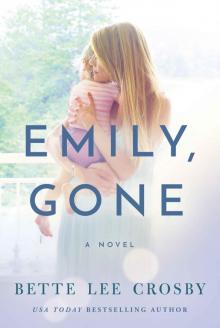 Emily, Gone
Emily, Gone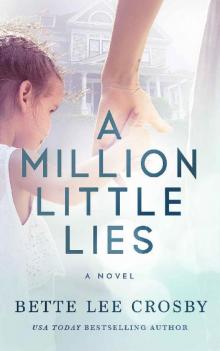 A Million Little Lies
A Million Little Lies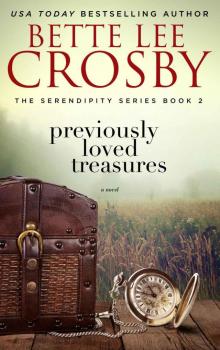 Previously Loved Treasures
Previously Loved Treasures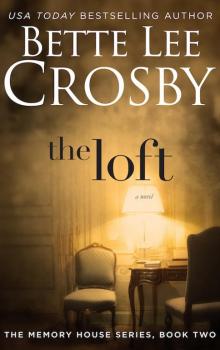 The Loft
The Loft Spare Change
Spare Change Memory House: Memory House Collection (Memory House Series Book 1)
Memory House: Memory House Collection (Memory House Series Book 1)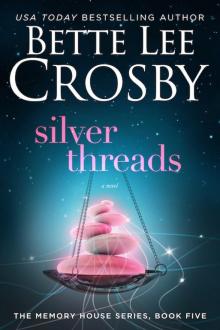 Silver Threads
Silver Threads Wishing for Wonderful: The Serendipity Series, Book 3
Wishing for Wonderful: The Serendipity Series, Book 3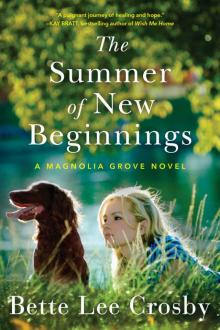 The Summer of New Beginnings: A Magnolia Grove Novel
The Summer of New Beginnings: A Magnolia Grove Novel The Regrets of Cyrus Dodd
The Regrets of Cyrus Dodd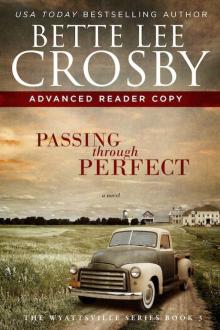 Passing Through Perfect
Passing Through Perfect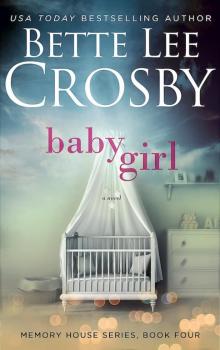 Baby Girl
Baby Girl Jubilee's Journey
Jubilee's Journey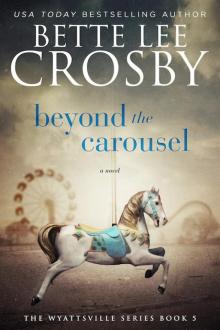 Beyond the Carousel
Beyond the Carousel What the Heart Remembers
What the Heart Remembers Cupid's Christmas
Cupid's Christmas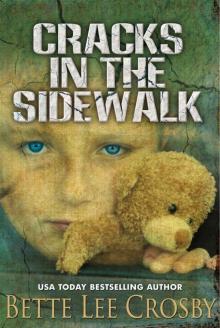 Cracks in the Sidewalk
Cracks in the Sidewalk Blueberry Hill
Blueberry Hill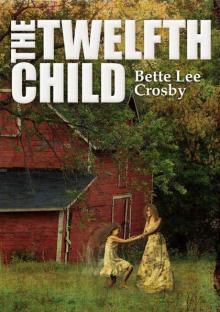 The Twelfth Child
The Twelfth Child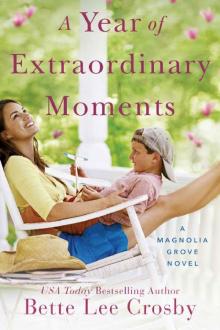 A Year of Extraordinary Moments (A Magnolia Grove Novel)
A Year of Extraordinary Moments (A Magnolia Grove Novel)